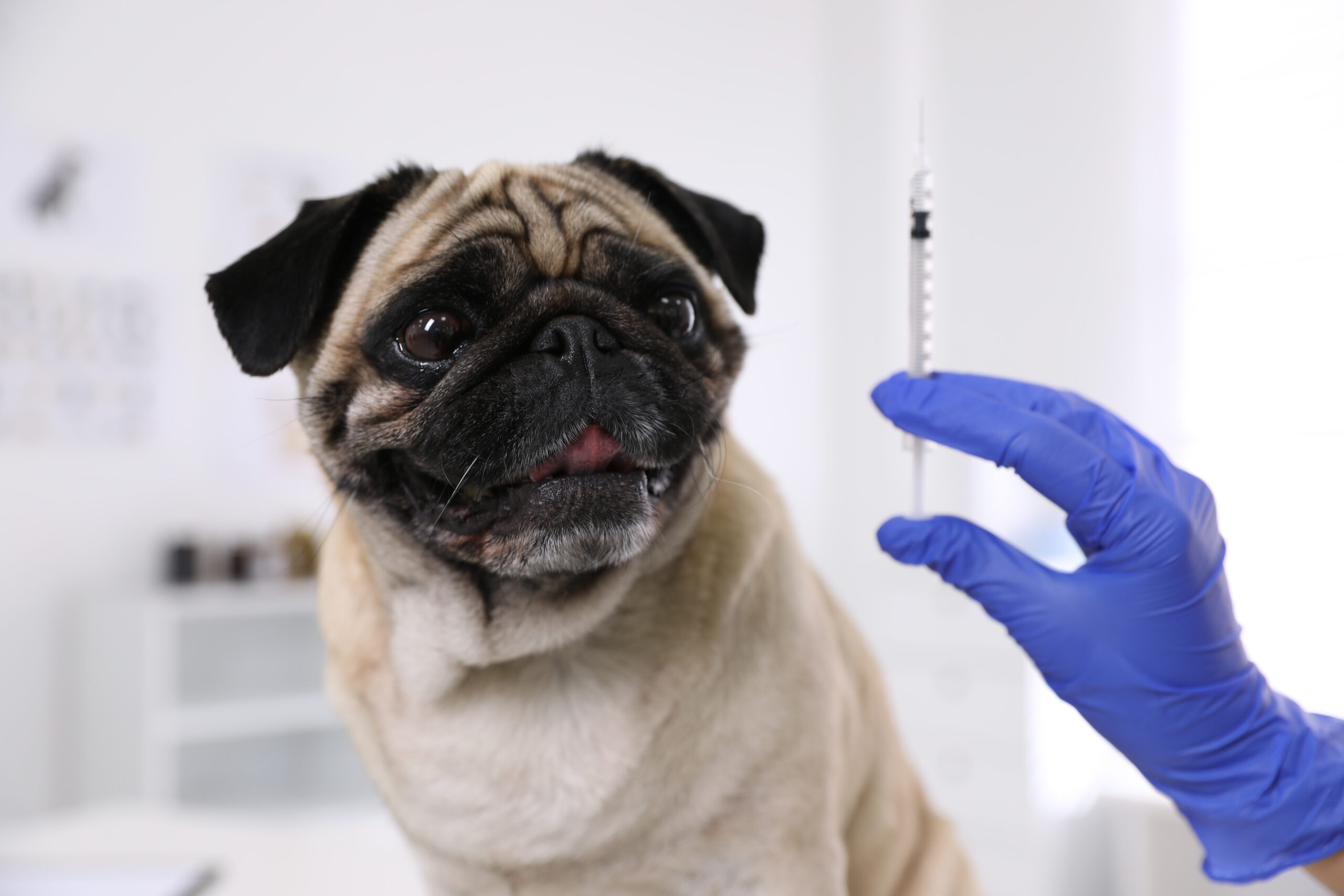If you notice your dog has an unusual, persistent cough, and just doesn’t seem like themselves—they might have kennel cough.
Kennel cough is very common and very contagious. In fact, it’s one of the most common infectious diseases in dogs. We’ll take you through causes, symptoms, treatments, and even arm you and your pup with some preventative measures for kennel cough, so you can both breathe easy.
- Kennel cough, also called canine infectious tracheobronchitis, is a respiratory disease that spreads through direct contact, from airborne droplets, and even from sharing water bowls.
- Kennel cough symptoms include a dry cough, runny eyes and nose, lack of appetite, and lethargy.
- Your dog could contract kennel cough any time there’s contact with another dog, but it’s most likely they will get the disease in an area with lots of other dogs present: a boarding facility, a doggy daycare, a dog park, etc.
- Common treatments for kennel cough include rest, antibiotics, and in some cases, a nebulizer.
- Keeping your pup to date on their vaccines, especially their bordetella vaccine, is your pup’s best line of defense against kennel cough.
What is kennel cough?
Kennel cough, also called canine infectious tracheobronchitis, is a respiratory disease that spreads easily among dogs. Dogs can get kennel cough from direct contact, from airborne droplets, and even from sharing water bowls.
Like the common cold in humans, kennel cough isn’t just one virus, but a number of viruses that can cause similar symptoms.
Basically, kennel cough spreads when dogs inhale bacteria and viruses like bordetella, canine parainfluenza, and canine respiratory coronavirus into their respiratory tract (this is also how diseases like canine distemper virus and canine herpes virus spread). Their respiratory tract can get infected, resulting in inflammation in the voice box and windpipe, which will then cause your pup to cough.
Kennel cough often spreads in areas where dogs are in close contact with each other, like in boarding facilities, dog parks, dog shows and competitions, and training groups.
What are the symptoms of kennel cough?
The most classic and easily recognizable symptom of kennel cough is an unusually loud, dry cough that is often described as sounding like a goose honk.
The cough is often persistent, and can linger for several weeks. Symptoms can vary. Your pup may or may not experience the following additional signs of kennel cough:
- Runny eyes and nose
- Wheezing
- Lack of appetite
- Lethargic or depressed behavior
- Low fever
If your dog develops an unusual cough that won’t go away, it’s important to get them to a vet to confirm what’s causing the issue. Kennel cough symptoms also closely resemble canine distemper virus and canine influenza virus. It’s important that your dog receives the right treatment for any illness that they’re experiencing, as early as possible.
The good news is that kennel cough is mild and resolves without complications for most dogs. Unfortunately, kennel cough can be more severe in young puppies and dogs with compromised immune systems.
When left untreated, kennel cough can sometimes cause dogs to develop pneumonia.
When is my dog most likely to get kennel cough?
Your dog could potentially contract kennel cough any time there’s contact with another canine, but it’s most likely that your dog will get the disease in an area with lots of other dogs present. This could be a boarding facility, a doggy daycare, a dog park, or a similar setting that’s popular with pups.
Certain factors can weaken the mucus in your dog’s respiratory tract, meaning your dog is more vulnerable to catching kennel cough. Cold temperatures, cigarette smoke, dusty air, poor ventilation, and even stress resulting from travel can make your dog more vulnerable to the bacteria and viruses that cause this condition.
There’s a vaccine available for kennel cough, and whether or not your dog is vaccinated will also affect their chances of getting the disease. If you know your dog will be going into one of these higher-risk areas, making sure their vaccine is up-to-date—it’ll boost your dog’s immunity and offer an extra layer of protection.
Keep in mind that if you have multiple dogs in your fur family, it’s likely that kennel cough will quickly spread from one dog to the others.
How do you treat kennel cough?
The treatment plan for kennel cough will depend on the disease’s severity and your dog’s symptoms.
If your dog has a mild case, then a week or two of rest might have them feeling as good as new. Your vet might prescribe cough medication to help relieve the pesky cough, and some may choose to prescribe antibiotics to help prevent kennel cough from developing into pneumonia.
If your dog has more severe symptoms, your vet might prescribe additional medications, or recommend using a nebulizer to get medication directly into your best bud’s respiratory tract.
While your dog has kennel cough, it’s important to keep them away from other dogs. Think of it as canine social distancing. That might mean canceling upcoming boarding reservations or missing out on training classes or trips to the dog park. Most dogs recover in two to three weeks, but more severe cases can last up to six weeks before your pup is truly back to their happy, healthy, and non-infectious self.
FYI: A base Lemonade pet insurance policy would likely keep your best friend covered in the event of an unexpected accident or illness (like kennel cough!). Apply in minutes to customize the right policy for your best friend.
How can you prevent kennel cough?
Since kennel cough is so contagious, the best way to prevent it is to avoid the areas where your dog is most likely to get the disease. Consider hiring an in-home pet sitter instead of boarding your dog, and if you enroll your dog in training classes, try to keep space between them and the other dogs. If you do end up boarding your dog, try to choose a facility with stricter guidelines around vaccination protocols.
It’s also helpful to be familiar with the symptoms of kennel cough. If you’re ever out in public and you see a dog coughing, sneezing, or with a runny nose, that dog might be sick. Keep your distance.
Beyond those common sense precautions, it’s a good idea to give your dog the kennel cough vaccine. A vaccine helps to protect your dog against bordetella, a bacteria that often causes kennel cough. This bordetella vaccine is available in three forms: an injection; a version that is misted up your dog’s nose; and an oral prophylactic.
Depending on which vaccine your dog receives, they’ll get two doses that are given two to four weeks apart. After that, your dog will receive vaccines annually. If your dog is at high risk for kennel cough, your vet may recommend a six-month booster.
These vaccines can help to boost your dog’s immunity against bordetella, but kennel cough can be caused by other bacteria and viruses, like canine parainfluenza virus and canine respiratory coronavirus. This means the vaccine can help to reduce your dog’s chances of getting sick, but it won’t guarantee that your dog won’t get sick.
Still: If you want to reduce the chance of your dog getting kennel cough, the smartest thing to do is keep them up-to-date on their vaccinations. Lemonade Pet offers several affordable preventative care add-on packages, which can help pay for many of the wellness treatments your pup needs to stay healthy and happy—including vaccines.

Before we head to the dog park…
While kennel cough is highly contagious, you can take steps to reduce your best friend’s chance of getting this disease. If your pup does develop kennel cough, being familiar with the symptoms means you’ll know to call your vet and get your pup the right care.
We hope you and your pup never have to deal with kennel cough, but being prepared and knowing the signs means you could get your dog back to feeling paw-some, sooner.
A few quick words, because we <3 our lawyers: This post is general in nature, and any statement in it doesn’t alter the terms, conditions, exclusions, or limitations of policies issued by Lemonade, which differ according to your state of residence. You’re encouraged to discuss your specific circumstances with your own professional advisors. The purpose of this post is merely to provide you with info and insights you can use to make such discussions more productive! Naturally, all comments by, or references to, third parties represent their own views, and Lemonade assumes no responsibility for them. Coverage and discounts may not be available in all states.





